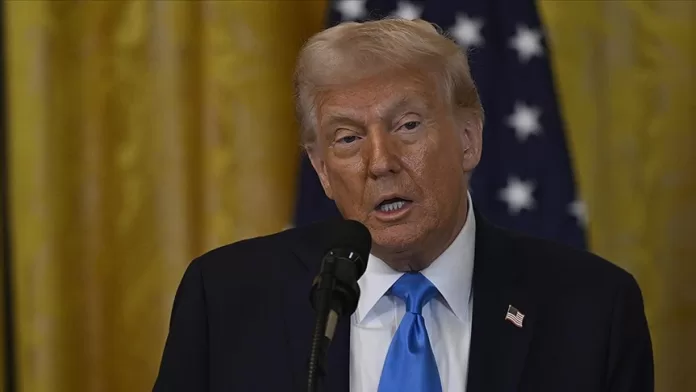President Donald Trump has announced a series of sweeping tariffs on foreign-made cars and auto parts imported into the U.S. on Wednesday, imposing a new 25% import tax on both vehicles and car components entering the country.
This announcement comes ahead of Trump’s so-called “Liberation Day” for the world’s biggest economy on April 2. a prelude to the April 2 “Liberation Day” duties that are expected to hit a wide variety of goods made by many of the largest U.S. trading partners.
Trump said the latest tariffs would come into effect on 2 April, with charges on businesses importing vehicles starting the next day. Taxes on parts are set to start in May or later.
The president said the measure would lead to “tremendous growth” for the industry, promising it would spur jobs and investment in the US.
Speaking from the Oval Office, Trump initially said he was imposing a 25% tariff on all cars coming into the country.
“What we’re going to be doing is a 25 percent tariff on all cars that are not made in the United States. If they’re made in the United States, it is absolutely no tariff,” Trump said at the White House.
The White House later clarified that foreign auto parts would also be taxed at the 25% rate even if the vehicles they go into are assembled domestically.
However, companies that import vehicles under the United States-Mexico-Canada Agreement (USMCA) will get special consideration until the Commerce Department establishes a process for levying the 25% duties, the White House said.
USMCA-compliant auto parts will remain tariff-free until the commerce secretary, in consultation with U.S. Customs and Border Protection, establishes a process to apply tariffs to their non-U.S. content.
Trump said he expects auto companies to relocate to the U.S. and build new sites or expand existing ones. He hit out at companies that have opened facilities in Canada and Mexico in recent decades, at what he said was the expense of U.S. workers.
“If you build your car in the U.S., there’s no tariff,” he said.
Collection of the tariffs will begin April 3, and Trump said they would be “permanent.” He asserted that the U.S. could end up collecting as much as $100 billion from tariff revenues.
READ ALSO: UK releases List of 58 dead Nigerians with unclaimed estates
But analysts have said the move is likely to lead to the temporary shutdown of significant car production in the US, increase prices, and strain relations with allies.
Trump’s latest move threatens to upend global car trade and supply chains.
The US imported about eight million cars last year – accounting for about $240bn (£186bn) in trade and roughly half of overall sales.
Mexico is the top supplier of cars to the US, followed by South Korea, Japan, Canada and Germany.
Many US car companies have operations in Mexico and Canada as well, set up under the terms of the longstanding free trade agreement between them.
Shares of the top U.S. automakers fell sharply in after-hours trading on the announcement, with General Motors down more than 7%, Ford off 4.6% and Stellantis lower by 4%.
Shares of Asian automakers also fell during trading on Thursday, Reuters reported, with Japanese automakers Nissan, Toyota and Honda closing down 2.2%, 2.7% and 3%, respectively. In South Korea, Hyundai Motor and Kia both fell about 4%.
Jennifer Safavian, president and CEO of Autos Drive America, a trade group that represents U.S. operations of international automakers, said in a statement: “The tariffs imposed today will make it more expensive to produce and sell cars in the United States, ultimately leading to higher prices, fewer options for consumers, and fewer manufacturing jobs in the U.S.”
Foreign leaders and automakers also criticized the tariffs. Japanese Prime Minister Shigeru Ishiba said his government was “putting all options on the table” to respond, while the German Association of the Automotive Industry said the tariffs sent “a disastrous signal for free, rules-based trade.”
Canadian Prime Minister Mark Carney called the tariffs a “direct attack” on Canadian workers and said he was considering additional retaliatory tariffs. European Commission President Ursula von der Leyen said she deeply regretted the U.S. decision and that the European Union “will continue to seek negotiated solutions, while safeguarding its economic interests.”
In a post on X, Elon Musk said Tesla would be affected by the measures. “To be clear, this will affect the price of parts in Tesla cars that come from other countries. The cost impact is not trivial. The tariff impact on Tesla is still significant,” he said.
On Thursday, world powers also blasted US President Donald Trump’s steep tariffs on imports of vehicles and car parts, vowing retaliation as a widening trade war intensifies.
Major car exporter Germany called for a firm response from the EU, while Japan said it “will consider all options.”
Stock markets across Asia and Europe skidded into the red as auto manufacturers from Toyota to Hyundai and Mercedes led the plunge.
France Finance Minister Eric Lombard condemned the “hostility,” saying that the “only solution for the European Union will be to raise tariffs on American products in response.”
Washington’s major trading partners warned of retaliatory action, Trump ramped up his threats.
In response to the threats Trump posted on his TruthSocial network “If the European Union works with Canada in order to do economic harm to the USA, large scale Tariffs, far larger than currently planned, will be placed on them both in order to protect the best friend that each of those two countries has ever had!”

